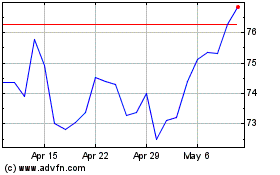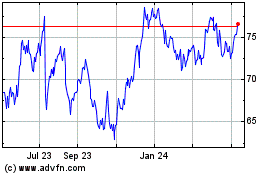State Street Hedge Fund Study of Institutional Investors Shows Rising Asset Levels and Growing Comfort with Alternative Investm
March 29 2006 - 8:30AM
Business Wire
State Street Corporation (NYSE: STT), the world's leading provider
of financial services to institutional investors, released today
its second institutional investor hedge fund study. State Street
conducted the study late last year in conjunction with the 2005
Global Absolute Return Congress (Global ARC). Survey respondents
included global corporate pensions (18 percent), public and
government pensions (42 percent) and endowments and foundations (40
percent) with investable assets totaling more than U.S. $1
trillion. According to State Street's study, most investment boards
and trustees of institutions (81 percent) have become more
comfortable with investing in hedge funds in the past year, and the
majority (52 percent) of these governing bodies spend 15 percent or
more of their time discussing alternative investments. The survey
also found that most institutions intend to add new hedge fund and
private equity managers to their current manager line-up in the
coming year. "All signs indicate that what began as a niche
category catering mainly to high-net worth individuals and U.S.
endowments and foundations has become a permanent fixture within a
broader set of institutional portfolios," said Gary Enos, executive
vice president and head of State Street's alternative investment
servicing business. "Satisfied customers go a long way towards
explaining the industry's proliferation. Our study reveals hedge
funds are meeting institutional investors' expectations with an
astounding 100 percent satisfaction rate in achieving portfolio
diversification as well as high marks for lowering portfolio
volatility and increasing absolute return." Institutions Continue
to Increase Hedge Fund and Private Equity Allocations According to
the State Street study, nearly half (48 percent) of respondents
have 5 percent or more of their portfolios invested in hedge funds
today. Of this figure, most (44 percent) have 10 percent or more
invested in hedge funds. This represents an increase over 2004,
when only 35 percent of institutions said they had 10 percent or
more invested in hedge funds. For the first time, State Street also
surveyed respondents about the role of private equity in their
portfolios. Ninety percent of respondents allocate to private
equity. Nearly half (47 percent) allocated 5 percent or more to
this strategy. Nineteen percent said they allocate 10 percent or
more. Adding Alternative Investment Managers Institutional
investors who participated in State Street's study also indicated
that they have plans to hire new alternative investment managers in
the coming year. Eighty-six percent of respondents said they plan
to add new hedge fund managers to their current line-up, while 67
percent said their hiring plans included new private equity
managers. Separating "Alpha" and "Beta" Returns The results of
State Street's study also illustrate institutional investors'
growing appetite for separating asset class returns, or beta, and
absolute returns, or alpha. By disaggregating risk into "alpha" and
"beta" strategies, institutions can better tailor portfolios to fit
their specific investment objectives. Eighty-one percent of survey
respondents said they engaged new managers for both alpha and beta
returns, and a majority (59 percent) said they were able to
differentiate between a given manager's "alpha" and "beta" results.
Among those who said they could not differentiate (41 percent), an
overwhelming majority (82 percent) attributed this inability to a
lack of tools and/or resources. "As investors become more aware of
the benefits of separating alpha and beta, asset managers who can
provide a wide range of beta exposures and interchangeable alpha
sources are uniquely positioned," said Jane Tisdale, managing
director of hedge fund strategies for State Street Global Advisors,
the investment management arm of State Street Corporation. "Access
to customizable resources such as alpha porting techniques offer
increased transparency in measuring and rewarding performance and
allow the flexibility to increase portfolio diversification with a
low tracking error." For a copy of the study's key findings, please
contact publicrelations@statestreet.com. State Street Corporation
(NYSE:STT) is the world's leading specialist in providing
institutional investors with investment servicing, investment
management and investment research and trading services. With $10.1
trillion in assets under custody and $1.4 trillion in assets under
management (as of 31 December 2005), State Street operates in 26
countries and more than 100 geographic markets worldwide. For more
information, visit State Street's website at www.statestreet.com.
This news release may contain forward-looking statements, as
defined by federal securities laws, including statements about the
financial outlook and business environment. Any such statements are
based on current expectations and involve a number of risks and
uncertainties. Important factors, including those mentioned in this
news release, that could cause actual results to differ materially
are set forth in the company's 2005 annual report and subsequent
SEC filings. They include risks and uncertainties relating to the
pace at which State Street adds new clients or at which existing
clients use additional services, the value of global and regional
financial markets, and the dynamics of the markets State Street
serves. State Street encourages investors to review its annual
report and SEC filings in conjunction with this announcement and
prior to making any investment decision. The forward-looking
statements contained in this news release speak only as of the date
of release, March 29, 2006, and the company does not undertake to
revise those forward-looking statements to reflect events after the
date of this release.
State Street (NYSE:STT)
Historical Stock Chart
From May 2024 to Jun 2024

State Street (NYSE:STT)
Historical Stock Chart
From Jun 2023 to Jun 2024
